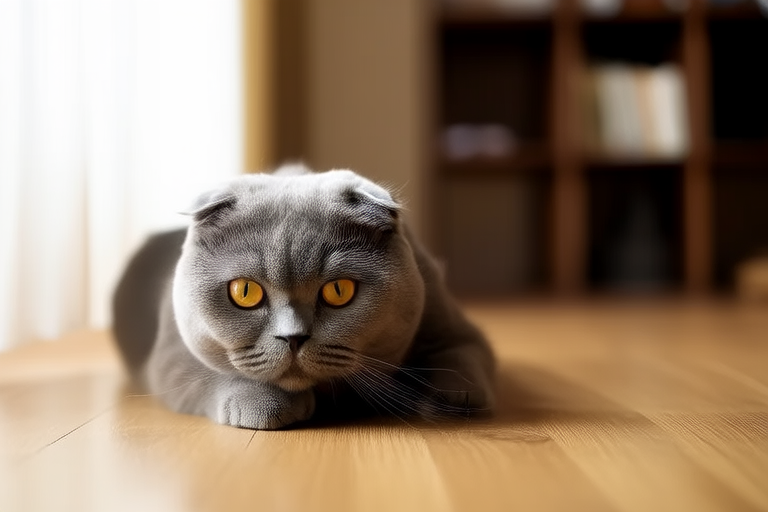Scottish Fold Cats: The Ultimate Guide for First-Time Owners
Welcome to the wonderful world of Scottish Fold cats! These charming felines have captured the hearts of many with their distinctive appearance and affectionate nature. Whether you’re a seasoned cat owner or a first-time pet parent, this guide will provide you with all the essential information you need to understand and care for your Scottish Fold. From their unique physical traits to their specific dietary needs and common health issues, we’ve got you covered.
Introduction to Scottish Fold Cats
The Scottish Fold cat breed originated in Scotland during the 1960s when a barn cat named Susie was discovered with a natural genetic mutation that caused her ears to fold forward. This unique trait was selectively bred, resulting in the beloved Scottish Fold we know today. These cats are known for their round faces, large eyes, and folded ears, which give them an owl-like appearance. Their medium-sized bodies are sturdy, with short legs and a thick tail that tapers slightly.
Unique Physical Characteristics
One of the most striking features of Scottish Folds is their folded ears. Not all kittens born to Scottish Fold parents will have folded ears; about half of the litter may have straight ears instead. The fold in the ears can vary in degree, from a slight bend to a tight fold. Their coats come in a variety of colors and patterns, and they can have either short or long hair. The short-haired variety has a plush, dense coat, while the long-haired version is known as the Highland Fold.
Temperament and Personality
Scottish Folds are known for their gentle and sweet disposition. They are typically calm, friendly, and get along well with other pets and children. These cats enjoy human companionship and often follow their owners around the house, seeking attention and affection. However, they are not overly demanding and can be quite independent, making them suitable for both busy households and those looking for a more laid-back companion. They tend to be vocal but not excessively so, often communicating with soft chirps and meows.
Care Requirements
Like any pet, Scottish Folds require proper care to ensure they live a healthy and happy life. This includes regular veterinary check-ups, appropriate nutrition, and a safe living environment.
Choosing the Right Kitten
When selecting a Scottish Fold kitten, it’s important to choose a reputable breeder who prioritizes the health and well-being of their cats. Look for a breeder who provides documentation of health clearances and genetic testing for hereditary conditions. It’s also beneficial to visit the breeder’s facility and meet the parents of the kittens if possible. Choose a kitten that appears healthy, active, and curious, and one that seems comfortable around people.
Grooming Needs
Scottish Folds have relatively low grooming needs compared to some other breeds. Short-haired varieties require minimal brushing, while long-haired Folds benefit from weekly brushing to prevent matting. Regular nail trimming and dental hygiene are also important aspects of their care routine. Bathing should be done only when necessary, as over-bathing can strip their skin of its natural oils.
Dietary Considerations
A balanced diet is crucial for maintaining your Scottish Fold’s health. High-quality commercial cat food that meets the nutritional requirements for your cat’s age, weight, and activity level is recommended. Consult with your veterinarian to determine the best diet for your pet. Fresh water should always be available, and treats should be given sparingly to avoid obesity.
Common Health Issues
While Scottish Folds are generally healthy, they are prone to certain genetic conditions. One of the most serious concerns is osteochondrodysplasia (OCD), a condition affecting the cartilage development that can lead to arthritis and mobility issues. Responsible breeding practices have helped reduce the incidence of OCD, but it’s still important to be aware of this potential health issue. Regular veterinary check-ups can help catch any developing problems early.
Socializing and Training
Early socialization is key to ensuring your Scottish Fold becomes a well-adjusted adult cat. Expose your kitten to various environments, people, and other animals from a young age. Positive reinforcement training can be used to teach basic commands and tricks, such as sitting or coming when called. Patience and consistency are essential for successful training.
Creating a Safe and Comfortable Environment
Your home should be set up to provide a safe and comfortable environment for your Scottish Fold. Provide scratching posts and toys to keep them mentally and physically stimulated. Cat-friendly furniture and cozy beds can make your home even more inviting. Secure windows and balconies to prevent accidental falls. Install cat flaps if you want your cat to have access to the outdoors, but be mindful of potential dangers such as traffic and other animals.
Long-Term Commitment and Joys of Ownership
Owning a Scottish Fold is a long-term commitment that comes with numerous joys. These cats form strong bonds with their owners and can bring immense happiness into your life. They are loyal companions who thrive on love and attention. As they grow older, they may develop certain health issues, but with proper care, they can enjoy a long and fulfilling life. The satisfaction of watching your cat grow and develop into a loving family member is truly rewarding.
In conclusion, Scottish Fold cats are unique, affectionate, and delightful companions. By understanding their special needs and providing them with the care they deserve, you can ensure a lifetime of happiness and joy. With patience, love, and dedication, you and your Scottish Fold will share countless memorable moments together.
